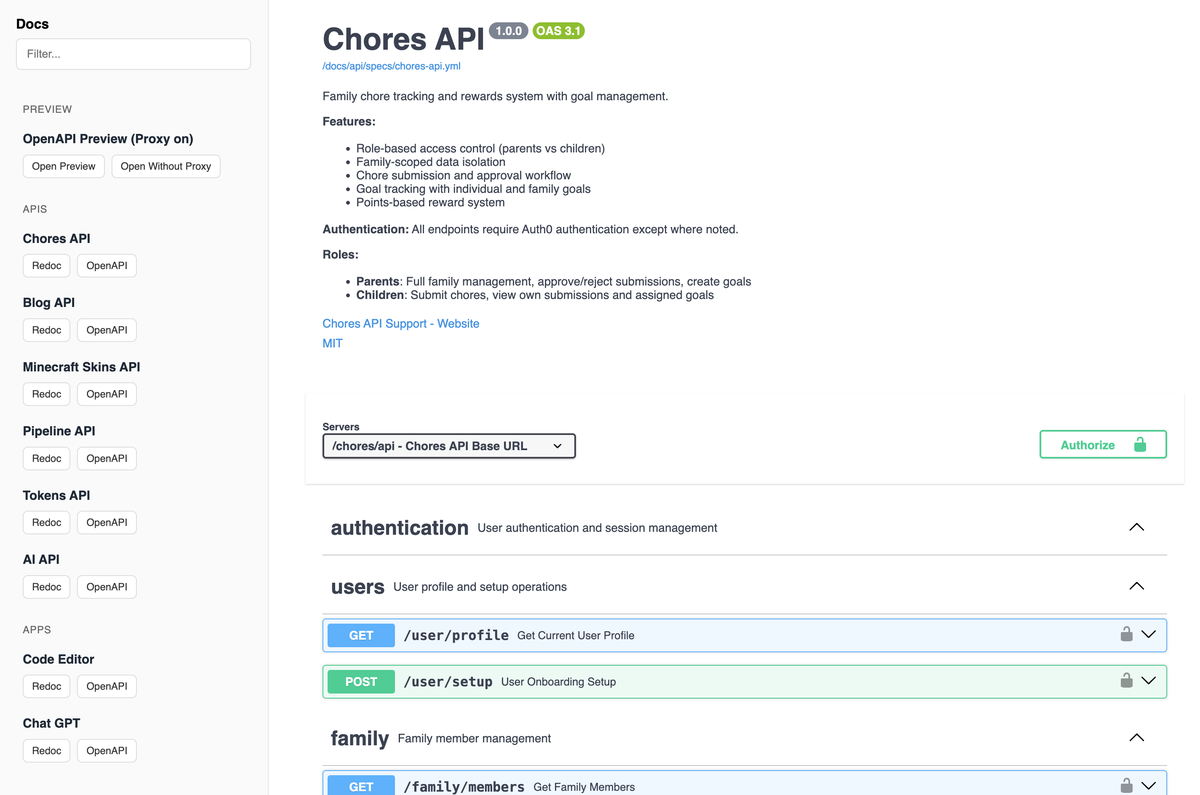Docs: Interactive API Documentation Platform
A NextJS service that provides comprehensive, interactive API documentation for all HomeStack microservices using OpenAPI specifications and modern documentation tooling.
Overview
As my microservices architecture grew, maintaining accurate and accessible API documentation became crucial. This documentation platform centralizes all API specifications while providing interactive testing capabilities and seamless integration with development workflows.

Key Features
Unified Documentation Hub
- Multi-Service Support: Single platform for all microservice APIs
- OpenAPI Integration: Standards-based documentation using OpenAPI 3.0
- Interactive Interface: Live API testing directly from documentation
- Per-service ownership: Each service owns its spec in
docs/openapi.yml, mounted into the Docs service
Developer Experience
- Redoc + Swagger UI: Clean, modern documentation interfaces
- Code Examples: Auto-generated code samples in multiple languages
- Try It Out: Interactive endpoint testing via a proxy
- Preview Mode: Upload a spec in-browser to preview without committing
Technical Architecture
NextJS Platform
src/
├── pages/
│ ├── api/
│ │ ├── proxy.js # Live API proxy for Try-It-Out
│ │ └── specs/[...file].js # Serves mounted specs from /spec
│ ├── oas/[...slug].js # Swagger UI renderer
│ ├── redoc/[...slug].js # Redoc renderer
│ └── index.js # Documentation landing page
└── components/
├── Navigation.js # Service navigation
└── PageWrapper.js # Consistent page layoutSpecification Management (Mounted per Service)
Each microservice keeps its OpenAPI spec in-repo at docs/openapi.yml. The Docs service mounts those files read-only under /spec inside the container. Example from docker-compose.yml:
docs:
build: ./docs
volumes:
- ./ai-api/docs/openapi.yml:/spec/ai-api.yml:ro
- ./chat-gpt/docs/openapi.yml:/spec/chat-gpt.yml:ro
- ./chores/docs/openapi.yml:/spec/chores-api.yml:ro
- ./code-editor/docs/openapi.yml:/spec/code-editor.yml:ro
- ./mc-skins/docs/openapi.yml:/spec/mc-skins.yml:ro
- ./tokens/docs/openapi.yml:/spec/tokens.yml:ro
- ./tools/docs/openapi.yml:/spec/pipeline.yml:ro
- ./nickhedberg_blog_api/docs/openapi.yml:/spec/blog-api.yml:roImplementation Details
Spec Serving Endpoint
Specs are served from the mounted /spec directory using a simple Next API route:
// pages/api/specs/[...file].js
const fs = require("fs");
export default function handler(req, res) {
if (req.method !== "GET") return res.status(405).json({ message: "Method Not Allowed" });
const { file } = req.query;
if (!file) return res.status(400).json({ message: "Bad Request" });
const filePath = `/spec/${file}`;
if (!fs.existsSync(filePath)) return res.status(404).json({ message: "Not Found" });
fs.createReadStream(filePath).pipe(res);
}Interactive Documentation
The platform supports both Redoc and Swagger UI: - Responsive Design: Mobile-friendly documentation interfaces - Syntax Highlighting: Code examples with proper syntax coloring - Deep Linking: Direct links to endpoints and operations - Preview Upload: In-browser spec preview without committing
API Proxy Integration
// Live API testing through proxy
export default async function handler(req, res) {
const { service, endpoint } = req.query;
const apiUrl = getServiceUrl(service) + endpoint;
const response = await fetch(apiUrl, {
method: req.method,
headers: req.headers,
body: req.method !== 'GET' ? JSON.stringify(req.body) : undefined
});
return res.status(response.status).json(await response.json());
}